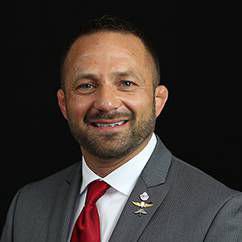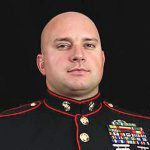Two veterans who struggled to regain their lives upon returning from their tours of duty but eventually found healing through faith spoke of their journeys during a pre-Veteran’s Day presentation at Malibu Presbyterian Church on Friday evening.
The event was put on by the nonprofit Serving California Foundation, established in 2013 by local conservative billionaire Wayne Hughes, Jr., and highlighted the Mighty Oaks Warrior Program for veterans.
Chad Robichaux, director of veteran affairs for the organization and Friday’s keynote speaker, is a former U.S. Special Operations Force Recon Marine veteran with eight tours of duty, co-author of the best-seller “Redeployed: How to fight the battle within and win the war at home,” pro mixed-martial-arts (MMA) champion and post-traumatic stress disorder (PTSD) survivor.
To an audience of about 75, including eight veterans, Robichaux related a combat story from Kabul, Afghanistan in 2004. Driving a military vehicle into the city, he spotted a Toyota pick-up loaded with Taliban and rocket-launchers coming up behind them.
“Their truck pulled in front of ours and traffic stopped,” Robichaux said. “… I slammed down the gas pedal, aimed my vehicle at them, hit them and Taliban flew everywhere.”
When he went home to his family after eight tours of duty, he was diagnosed with PTSD.
“I had an impending sense of doom. I was fearful to tell people what was going on inside. I felt exposed if I went outside the house and claustrophobic if I stayed inside the house,” he said. At times, he thought his family would be better off without him.
To dull the feelings, Robichaux poured himself into teaching and competing in MMA.
“I loved wrestling mats and wasn’t being the father I was supposed to be … The façade of success came crashing down when we sold our house and started divorce proceedings … I was too prideful to admit I had a problem and didn’t like being called a quitter.”
After seeking advice, Robichaux started working on his “relationship with God” and everything in his life began falling into place. He reunited with his family and discovered a new purpose in life. “Now, I get to fight a new fight,” Robichaux said. “I fight for my fellow veterans coming home.”
Branden Kunath, San Diego chapter leader and military liaison, told a similar story of redemption. He served in the Marines as an infantry gunner for 14 years, including a tour in Fallujah, Afghanistan where he “saw a lot of nasty things.” His truck was hit three separate times by rocket-propelled grenades (RPGs) or incendiary devices (IEDs, also known as roadside bombs).
Kunath’s life began a downward spiral after returning to the U.S. “I had been in charge of a 62-man platoon, and went from that to nothing. I just sat at home all day … I filled my heart with anger, hate and bitterness,” Kunath confessed. “I drove everyone away from me.” After battling an alcohol problem and almost destroying his third marriage, he sought help and went into the Wounded Warrior battalion at Camp Pendleton.
“Everything came together for me when I rededicated my life back to Christ,” Kunath said. In his new role, he takes great pride in pre- and post- follow-ups to the Mighty Oaks Warrior Program, maintaining the sense of brotherhood and camaraderie established on the ranch through weekly meetings.
Phil Dunn, president of Serving California, said there’s also “a real problem with vets getting employment,” and that the organization has “ambitious plans for job training and placement” in its future.
According to Serving California, 23 U.S. veterans commit suicide every day, and 80 to 90 percent of their marriages end in divorce. The group’s goal is to offer faith-based programs and ongoing support to veterans suffering from PTSD, in order to help them transcend these rock-bottom outcomes.
They host Mighty Oaks Warrior Programs at the Hughes-owned 18-thousand-acre Sky Rose Ranch near San Luis Obispo, an intense six-day retreat to establish camaraderie, confront past traumatic experiences and instill a sense of purpose. Most participants come from Camp Pendleton Marine Corps Base in San Diego County, but any soldier suffering from PTSD can contact them.


